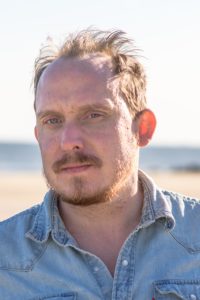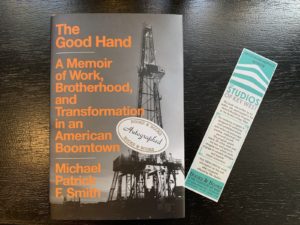Last March, we had the pleasure of introducing you to Michael Patrick F. Smith, when he was a Studios of Key West Artist-in-Residence. We are delighted to welcome him back to celebrate the release of the paperback edition of THE GOOD HAND Friday, Feb. 25 with an in-person, outdoors event. (Register here.)
Watch the 2021 author event:

Watch the replay of Michael Patrick F. Smith discussing his book with actor Shawn Hatosy.
Read last year’s Q&A:

Michael Patrick F. Smith is a folksinger and playwright currently based in central Kentucky. His plays, including Woody Guthrie Dreams and Ain’t No Sin, have been staged in Baltimore and New York. As a musician, he has shared the stage with folk luminaries such as Ramblin’ Jack Elliott, as well as several prominent indie rock bands. Smith has also worked as a stage actor, a bartender, junk hauler, furniture mover, book store clerk, contractor, receptionist, event producer, driver, office temp, stage hand, waiter, security guard, set fabricator, legal assistant, grocer, oil field hand, and now writer. THE GOOD HAND is his first book.
Q: How did you come to work in an oil field? What were you looking for at that time in your life and did you find it?
A: I went to work in the oil field for the same reason most people go to boomtowns, I wanted to make money fast and I was out of options. You could say my demons were catching up to me. I was surprised by what I found, because it wasn’t much money. It was better than that: a crystallization of my world view. It probably sounds strange to say it, but I also found a lot of healing, although it took writing the book for me to really realize that.

Q: When did you know you would write about the period of your life depicted in THE GOOD HAND? How did writing about those experiences change your understanding of them and of yourself at that time?
A: I started writing emails to a small group of friends as soon as I arrived in North Dakota looking for work. I got encouragement from these friends and my emails to them grew longer and longer to the point where I was sending them twenty page word docs. I was alone a lot at first, and the correspondence became a lifeline for me. When I left I had something like 130,000 words, so that is the source material for the book. It took me six more years to turn it into what it is now, so I think time is an important ingredient in the finished product. I spent a lot of time really meditating on the experiences and investigating my own thought process and emotional state, figuring out how this particular point in time tied together other aspects of my life.
Q: The audiobook includes some of your music. What do you think that adds to the experience of reading the book?
A: For me, music and prose are just different tools to use when telling a story. Music gives an immediate visceral emotional reaction: it is joyful or sad or haunting. I also write a lot about music in the book, which is difficult! I like to tell stories when I perform as a musician so weaving music throughout the audiobook felt really natural to me.
Q: Which came first for you, writing or music? Please tell us a little about how your work as a writer, playwright and musician come together.
A: I went to a public high school and a state college and I had incredible teachers. My high school drama teacher wrote plays with music, he played guitar and he designed and built the sets, too. He showed me how it was all woven together just by doing it, and he also encouraged me.
Later, when I was pursuing theater as a way to make a living there were long fallow periods and I began playing guitar more seriously so that I could pick up a little money, and also to get the joy that comes from performing. My closest friends have always been musicians. Music is also a way to communicate to musicians. It works better than words in many circumstances.
I also used to draw pictures of the plays I wrote as part of my writing process. I think I’ve just always been compelled to tell stories and I’ll use whatever is at hand to do it. One reason I wrote a book, if I’m completely honest, is that I kept getting screwed over by record labels and I was having trouble getting my plays produced. I was frustrated by the business side of those pursuits. I knew very little about publishing, but I knew when I sat down by myself and wrote, I could tap into that sacred space without anybody else around to muck it up.
Q: What are you finding are the most interesting or useful things you’ll take away from your time as a TSKW Artist in Residence? Do you want to share anything about what you’re working on now?
A: I’m working on some articles to support THE GOOD HAND, and also beginning research for what I think will be my second book. I’m also reading a ton from writers associated with Key West. I’ve been reading Hemingway, Jim Harrison and Thomas McGuane so far. For me, I get a lot of juice being in new places. The best writing looks through the world with a traveler’s eyes. This is my first time in Key West, so I’m just soaking in as much of the culture and the ecology and the experience of being here as I can. I fear it sounds a little lazy, but the truth is I know the more I dig into having a good time here, the more I’ll get out of this experience over the long run. I write every day because otherwise I feel insane, but I’m focused more on the experience.
Q: What are you reading and recommending these days?
A: Jim Harrison is blowing me away. Reading Legends of the Fall now. I’ve been living in Kentucky the past year and the writing of Wendell Berry, Thomas Merton and bell hooks have all become indispensable to me. The three of them, in their own different ways, write prose that calms the nervous system, and that is very valuable in these neurotic times. I always recommend Don Carpenter’s book Hard Rain Falling. It’s a criminally overlooked stone cold classic. Elizabeth Gilbert’s City of Girls is probably the best piece of newer fiction I’ve read all year.

Pingback: A Virtual Event with Michael Patrick F. Smith | Books & Books
Pingback: Our favorite books read in 2021